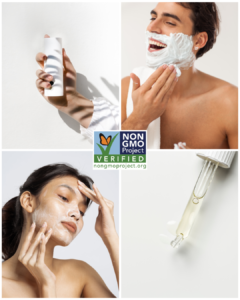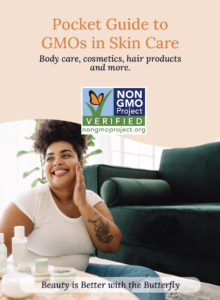Coming Clean
LIVE EVENT: Your guide to hidden GMOs in personal care
New GMOs in personal care products can go undetected by natural shoppers. Learn how to spot GMOs in the wellness space to help your customers find the products they want. As shopper confusion increases, so does the need for trustworthy certifications. That’s where the Non-GMO Project comes in.
To raise public and industry awareness, we’re shining a spotlight on biotech's footprint in beauty, skin care, vitamins, supplements and more.
Non-GMO isn’t just about food – it’s a lifestyle. It’s not just about what goes in your body, but also what goes on it. Join us as we explore new GMOs, identify biotech ingredients in the wellness aisle, and look at trends and sales data for the category. Plus, meet some of the most exciting brands working in the personal care space during our live panel discussion and Q&A.
Panelists include Katie Banaszewski, Sr. Director of Quality at NOW Foods; Loren Israelsen, President of United Natural Products Alliance (UNPA); Susan Griffin-Black, founder/CoCEO of EO Products; and Vicky Neilson, Product Development at Kirk's Family of Natural Brands.
View the slides from the presentation here.

Celebrate clean personal care with our media kit
Access our media kit to highlight Non-GMO Verified products in wellness and personal care by sharing these resources across your channels. Encourage your networks to be Better with the Butterfly!
Download our pocket guide for skin care
New GMOs are entering personal care products at a rapid rate. Use our Pocket Guide for GMOs in Skin Care to help identify genetically modified ingredients. Find our up-to-date research on brand names and resources for this rapidly changing product category.
GMOs in wellness FAQ
Download our Frequently Asked Questions guide to learn what GMOs are, where they show up in personal care products, and how to spot GMO ingredients. What marketing terms are red flags for GMOs?
GMOs are organisms whose genetic material has been altered using biotechnology in ways that don't occur in nature. GMOs can be commodity crops such as corn, soy and canola, with foreign DNA added to make them herbicide tolerant or make them produce their own insecticide. New GMOs made from emerging techniques are now entering the market at an alarming rate. These organisms generally face fewer regulatory hurdles, but they are still GMOs.
Genetically modified corn, soy and canola can be processed into a variety of ingredients, including oils for soaps and moisturizers, alcohol or citric acid. Also, microorganisms such as yeast or algae can be genetically modified to produce vitamins, fragrances, resveratrol and non-animal-derived collagen, squalene or spider silk. Functional ingredients such as humectants and surfactants can also be GMOs.
Some terms that are used to describe GMO techniques or ingredients include bioengineered, bioidentical, precision fermentation, engineered yeast and non-transgenic. Check out our Pocket Guide for a list of GMO ingredient names and manufacturers.
Many ingredients are available from natural sources, but it's always a good idea to look for ethically and sustainably-sourced products. For example, squalene is a popular ingredient in skin care products. It is naturally-occuring in shark liver, and synbio squalene is growing in popularity. However, squalene is also found in olives. We'd like to see plant-based sources explored before brands go looking for novel, genetically engineered compounds. Synthetic biology uses simple sugars such as corn or soy as food for the genetically modified microorganisms, and large areas of corn or soy monocrops can decimate biodiversity and increase pesticide use.


